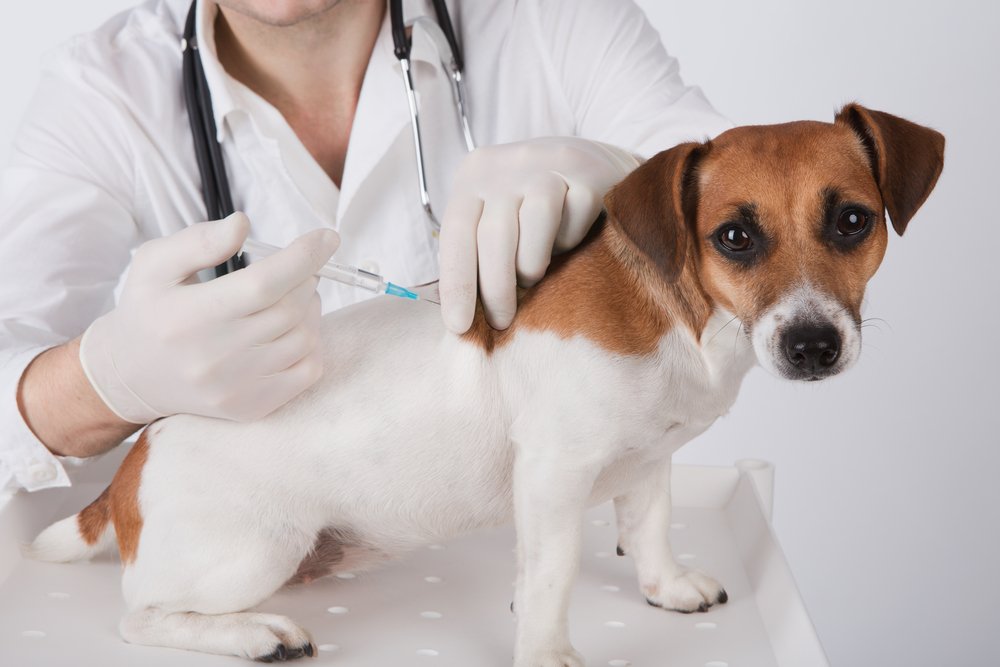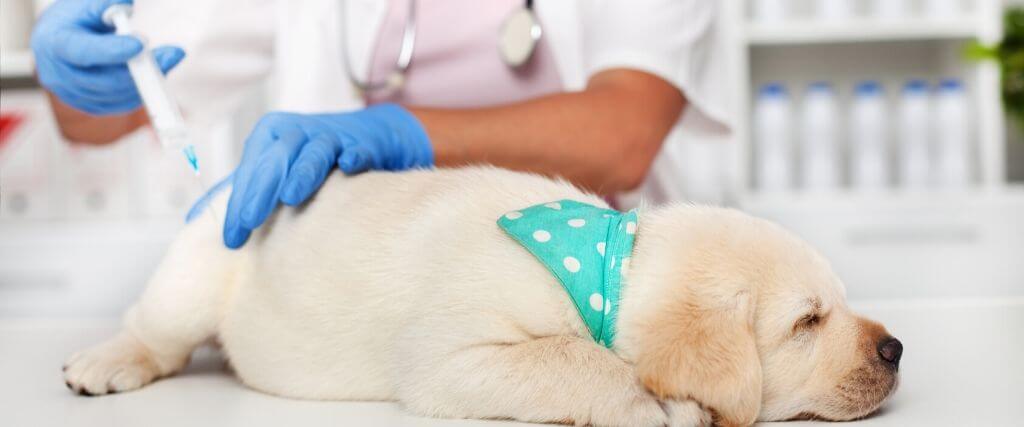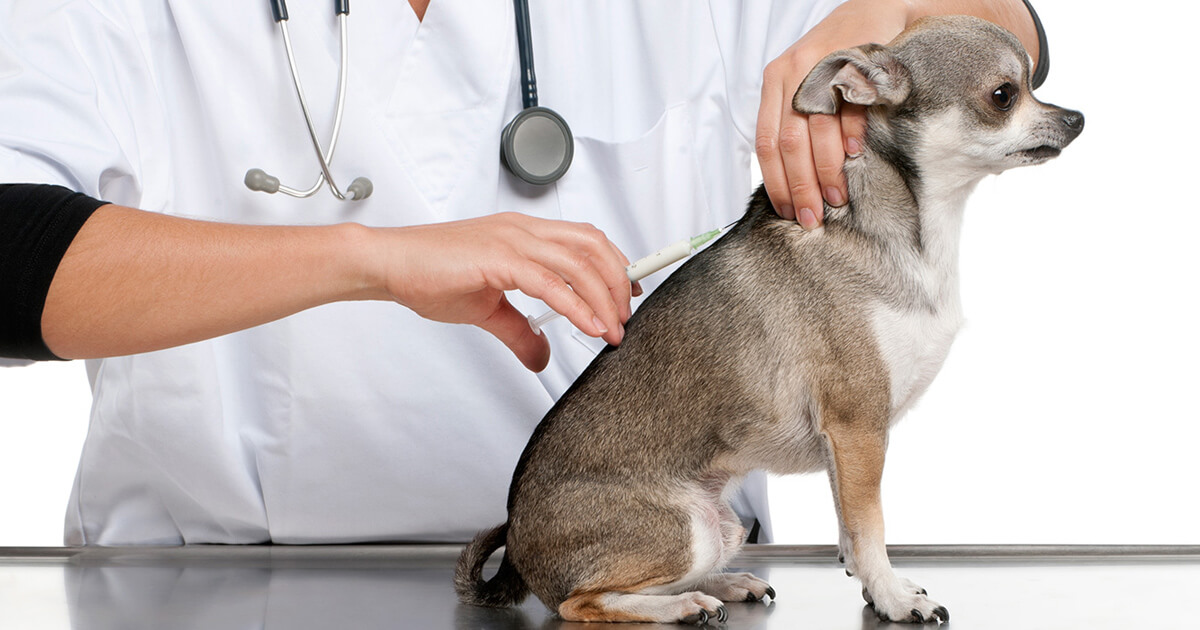Getting a new puppy can be overwhelming at times, especially when you have to deal with the dog vaccinations your puppy will require. There are so many of them out there and some dogs need all of them while other pups only need some.
In this post, we are going to go through all of the core and non-core dog vaccinations your pup may need and fill you in on the ideal dog vaccination schedule.
What is a Dog Vaccination?
A dog vaccination is just like a human one – it’s a prepared killed or altered microorganism that is administered into the body and stimulate the immune system to learn how to fight that microorganism should it be encountered in the future.
Dog vaccinations are generally given via injection although there are some that may be given locally (through the nose, as an example). Some dogs don’t respond well to needles so it’s often a great idea to distract them with a yummy treat when they are getting the shot.

Most puppies receive their first vaccines at 6-8 weeks of age but your vet will provide you with a clear schedule you should follow.
Are Dog Vaccinations Safe?
Just like we ask when it comes to vaccinations we have to get, the common question around dog vaccinations is whether or not they are safe. Similar to humans, dogs may develop a bit of lethargy or soreness 1-2 days after being vaccinated. Think of the last time you received a vaccination and had a sore arm where the injection occurred – your pup may feel the same way!
Very few dogs will develop severe reactions but if they do they usually occur within the first few hours. They can be accompanied by symptoms such as salivating, vomiting, diarrhea, hives or difficulty breathing. If any of those symptoms occur, it’s important you contact the vet immediately.
Core Dog Vaccinations
Core dog vaccinations are those that all dogs and puppies must be given regardless of where you live or your lifestyle. These vaccines include:

Distemper – This virus attacks the respiratory, gastrointestinal and nervous systems of dogs and can be transmitted by sharing food and water bowls with an infected animal. There is no cure for distemper.
Hepatitis – This affects the liver, kidneys, spleen, lungs and eye of an affected dog. There is no cure but the symptoms can be treated.
Parvovirus – This is a highly contagious virus that affects all dogs and attacks the gastrointestinal system, resulting in loss of appetite, vomiting, fever and diarrhea as well as extreme dehydration. There is no cure for parvovirus
Rabies – This is a viral disease that invades the central nervous system and causes headaches, anxiety, hallucinations, excessive drooling, paralysis and death. Most states require regular rabies vaccinations.
Heartworm – worms lodge in the heart and pulmonary arteries, and when they grow can block and injure organs. Heartworms are transmitted by mosquitoes and can be prevented through an oral medication.
Non-Core Dog Vaccinations
These dog vaccinations are important but may not be needed for all dogs. Your vet will be able to provide you with more information about whether your new pup should get these dog vaccinations:
Parainfluenza (often combined with DHP) – This virus can also contribute to kennel cough
Leptospirosis (requires 2 injections and annual boosters) – this is caused by a bacteria found in soil and water with symptoms that include fever, vomiting, abdominal pain, diarrhea, loss of appetite, etc.
Bordetella (can be given orally, intranasally or injectable) – this highly infectious bacterium causes severe fits of coughing, whooping and vomiting. It is the primary cause of kennel cough and is very contagious
Canine influenza (requires 2 vaccinations and annual boosters) – This often impacts a dog’s gastrointestinal system and can cause respiratory infections
Lyme (requires 2 vaccinations and annual booster) – This disease is spread through ticks (see our post on what ticks to watch out for) and can cause neurological disorders.
Typical Dog Vaccination Schedule for Puppies
There is not one specific dog vaccination schedule for puppies because of the impact of geography and individual breed that must be taken into consideration. Some pups do not need every single dog vaccination out there and this should be discussed with your vet.

However, here is a generally accepted guideline of the dog vaccination schedule for your pup’s first year at home.
Puppy Age | CORE VACCINE | NON-CORE VACCINE |
|---|---|---|
6-8 weeks | Distemper Parvovirus | Bordetella |
10-12 weeks | Distemper Hepatitis Parainfluenza Parvovirus (DHPP) | Influenza Leptospirosis Bordetella Lyme |
16-18 weeks | dHPP Rabies | Influenza Leptospirosis Bordetella Lyme |
12-16 months | DHPP Rabies | Influenza Leptospirosis Bordetella Lyme |
Every 1-2 years | dHPP | Influenza Leptospirosis Bordetella Lyme |
Every 1-3 years | rabies | None |
Final Thoughts
Taking care of a new puppy can definitely be overwhelming at time but sticking to the appropriate dog vaccination schedule is going to provide both you and your pooch with peace of mind! When all else fails, make sure you talk to your vet and get their recommendations on the best approach for protecting your furry friend!



